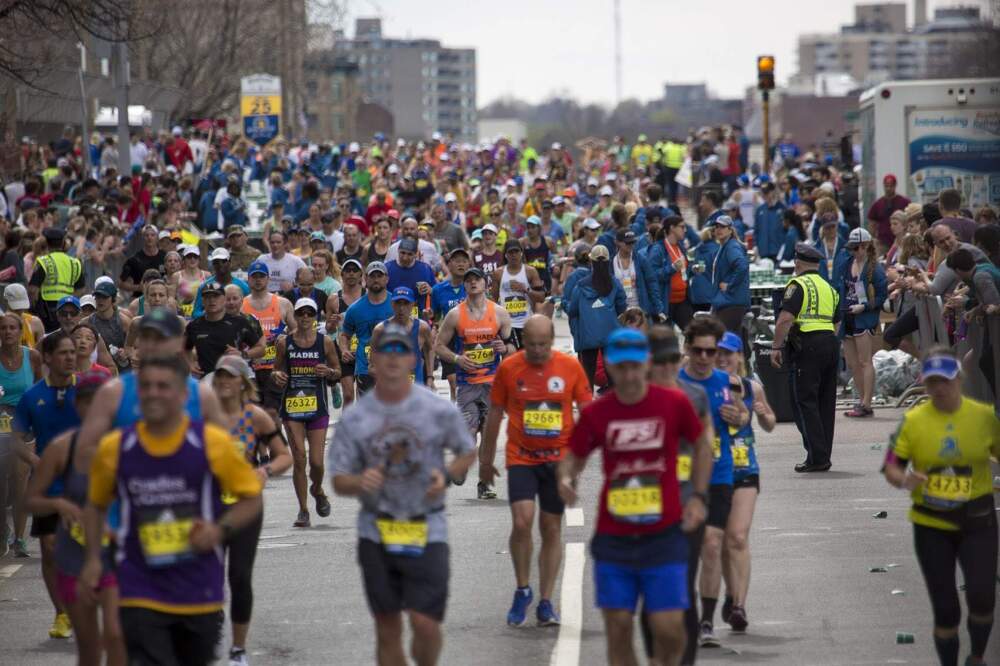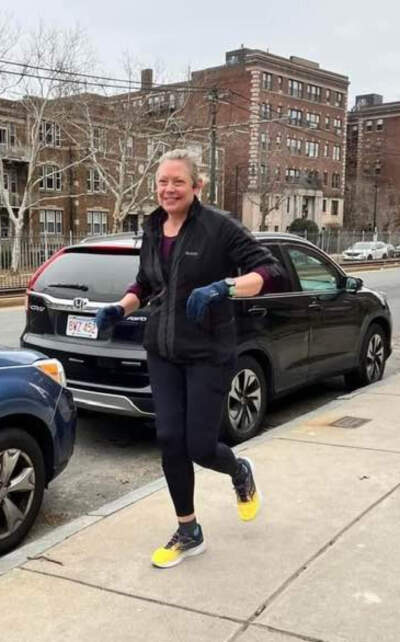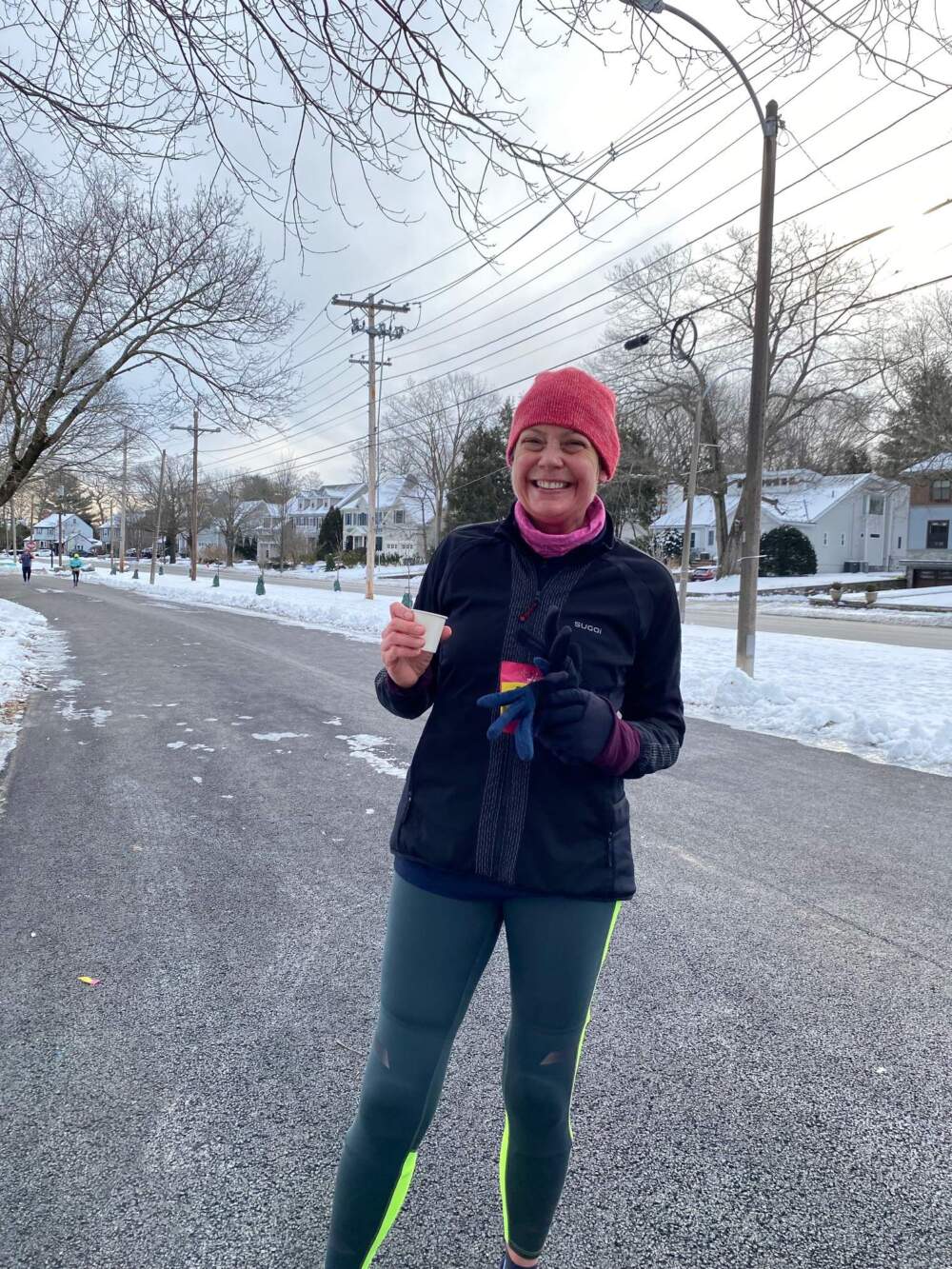Advertisement
Commentary
The Boston Marathon is every runner's dream, including mine
Resume
“If I want to run one last marathon,” I asked, “should I do it before or after a knee replacement?”
My orthopedist was leaning over my swollen right knee, shooting it full of cortisone.
“Before,” she said.

I’m not new to marathoning — I’ve run five — but my last was more than 20 years ago. I stopped running regularly when arthritis began eating away my knees, and haven’t run more than an occasional 5K in a decade.
But I’m 53 years old, and all sorts of doors are closing. I’m not having any more kids, I’m not starting a new career. I’m done with school, I have a husband and a house. In the next few years I’ll get my knees replaced and stop running altogether.
And I’m fine with all those closing doors, except the last one.
So, instead of accepting the end with grace and maturity, I’m going to jam my foot in the door and push it open wider. Maybe then I’ll have no regrets when it finally slams in my face.
That’s how I ended up running this year’s Boston Marathon.
When I signed up as a charity runner with Team Brookline last fall, I wasn’t sure I could finish the training, much less the race. But Boston is every runner’s dream, including mine. I watch the race every year. The elite runners, those otherworldly gazelles who barely touch the ground, are extraordinary, but I do my cheering a couple hours later, for the regular people. You know, the “punch-drunk ones, half walking at mile 23,” as Colson Whitehead wrote in his book “The Nickel Boys”:
Tumbling across the finishing line by hook or by crook, feet pounded to bloody meat in their Nikes. The laggards and limpers who weren’t running the course but running deep into their character — down into the cave to return to the light with what they’ve found.
Everyone running the Boston Marathon is pushing themselves to their physical limit, whether they finish in 2 hours or 12. It’s a test of perseverance and endurance that’s almost spiritual.
I wanted to be part of that. And honestly, I needed it. After helping care for my dying father and aunt during the pandemic, to say nothing of my not-so-uplifting work as a climate journalist — running a marathon felt like a hopeful act.
My 14-year-old son, Hugh, said my plan to run Boston was “courageous.” And also, “experimental.” Correct on both counts.
I started training in September, alternating between walking and running until I covered two miles. Training with my charity team began after Thanksgiving. Our mileage slowly increased for a few months, and my body took the added strain surprisingly well. My hip hurt, then stopped hurting. My knees ached, but not too bad. They’d reach a point of extreme discomfort and sort of stay there. I lost weight. I felt the old runner’s high. Other runners gave me the nod. It felt good.
If I wasn’t running, I was getting ready to run, or recovering from running.
As winter closed in, I realized I hadn’t really considered training for Boston in Boston. On weekday mornings I ran in the dark, sometimes in rain and snow. The long runs got longer every weekend: 10 miles, then 12, 13, 14, 15. Our weekly team runs were mostly on the marathon course, and we climbed to 16 miles, then 17, 18, 19, up and down Heartbreak Hill, over and over. I could barely recover from one run before starting the next.
My husband was supportive. He’s run seven marathons, he gets it. He tolerated my early bedtimes, my Saturday absences and the ever-present scent of Icy Hot. He dropped me off in one town for a point-to-point long run on the course, and picked me up, hours later, in a parking lot four towns away.

Three of my toenails turned black from the pounding. My knees swelled up like melons; I had them drained, twice. Everything hurt, all the time.
By February I felt almost feral when running. I spit on the sidewalk, blew my nose into my gloves and took candy from strangers. I yelled at cars in crosswalks and snarled at people hogging sidewalks. My knees had occasional sickening stabs of pain. Sometimes I stopped on the side of the road and started to cry.
At home, I furtively ate fistfuls of salt. Sometimes I drank pickle juice straight from the jar. It occurred to me that the several hours I spent running each week was the most “alone time” I’d cobbled together in years.
The closer we got to race day, April 15, the smaller my life became. When a friend asked me to dinner, I told her it’d have to wait until after the race; I was too busy sitting on the couch, icing my knees. If I wasn’t running, I was getting ready to run, or recovering from running.
I kept a record of that time, using the voice memo app on my phone. Listening back, I can hear my inner optimist and pessimist battling for dominance. One moment I’m describing my shattering knee pain, and despairing about ever finishing the marathon. The next moment I inventory the parts that don’t hurt — my feet aren’t too bad, I don’t have a headache, I didn’t throw up!
I had started this process trying to hold on to something from my younger days, but instead, I grew.
Eventually, the days brightened and the air warmed. (At least on occasion.) My knees still hurt but my mood improved. I watched inspirational sports movies and put the “Rocky” theme at the top of my running playlist. I made heaps of oatmeal raisin cookies and ate as many as I wanted. I bought daffodils.
And something surprising happened. I realized that the training had opened other doors — doors I didn’t notice, because I’d been so focused on the ones that were closing. I met new people, improved my running form. I figured out how to use Spotify and a Nutribullet and a fancy running watch. I raised more than $10,000 for charity.
I finished my final long run — 20 miles — in driving rain and thought: Maybe I could run another marathon! Or volunteer for Boston next year! I had started this process trying to hold on to something from my younger days, but instead, I grew.
My goal for the Boston Marathon is to finish within six hours; after that, they open the roads to traffic. Now, after seven months of training, I’m pretty sure I can do it. But I’m also pretty sure it doesn’t matter how or when I finish. Because I’ve run so far already.
The audio version of this piece was produced by Barbara Moran and Cloe Axelson with help from David Greene. It was mixed by Paul Calo.
This segment aired on April 12, 2024.
